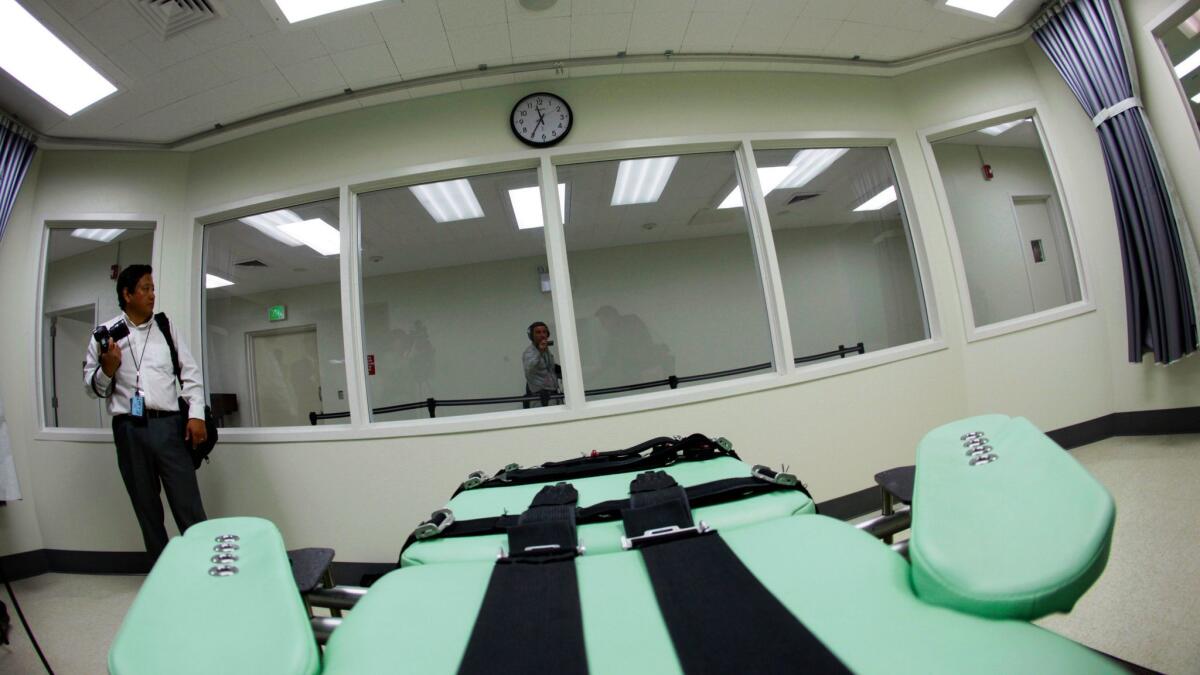Editorial: The death penalty lives on — and so should the fight to end it

A majority of California voters peered into their souls on election day and decided that, yes, they are OK with the government executing people in their names. That’s tragic, but, as the old saying goes, the people have spoken.
Perhaps even more disappointing than the rejection of Proposition 62, which would have ended the death penalty, was the passage of Proposition 66, the competing measure designed to speed up the death penalty appeals process. Californians, it seems, not only want to keep the death penalty in place, but they want to execute people more quickly and efficiently, and give the condemned less opportunity to appeal their fates. This measure already is being challenged in court on grounds that it will “impair the courts’ exercise of discretion, as well as the courts’ ability to act in fairness to the litigants before them,” among other things. Further court challenges are expected over potential violations of the constitutional right to due process. So there’s hope yet that the court system might save the state from itself.
Proposition 66 passed on the dubious promise that it would shorten the time between conviction and execution while saving tax dollars by requiring all state-level appeals to be completed within five years. It may, but it may not. After all, it actually adds a new layer to the appeals process. And it relies on a requirement that appellate-level lawyers take on capital cases even if they have no interest. And is a five-year limit fair? Note that 156 death row exonerations since 1973 occurred after an average of 11.4 years, according to the Death Penalty Information Center.
Rather than sigh and accept that state-sanctioned killings could resume, the anti-death penalty movement needs to take stock of where it stands and craft new strategies. Part of that involves determining why a majority of voters continue to see capital punishment as politically, fiscally and morally sound despite clear evidence of wrongful convictions, disproportionate targeting of the poor and people of color, exorbitant costs, and an appeals process that, while critically necessary, often adds to the arbitrary nature of who ultimately gets executed.
It’s perplexing, particularly, that many political conservatives don’t object to the ultimate in government overreach — killing citizens — nor find it problematic that the decision to seek the death penalty has less to do with the nature of the crime than it does with the zeal and politics of a particular county’s district attorney.
Polls show that support for the death penalty nationwide, despite Tuesday’s setback in California and the reinstatement of capital punishment in Nebraska, is fading. Perhaps the courts will take notice. After all, in recognizing the right of gays and lesbians to marry, the Supreme Court followed shifting national sentiment. Former Chief Justice Earl Warren once wrote that the court’s definition of “cruel and unusual punishment” must reflect “evolving standards of decency that mark the progress of a maturing society.” So let’s evolve, and mature.
The Supreme Court has already struck down the death penalty once before, deciding in Furman vs. Georgia in 1972 that capital punishment was disproportionately applied to minorities and the poor. But the court revived the practice four years later in Gregg vs. Georgia, ruling that capital punishment was not inherently unconstitutional.
So is there a legal challenge that might get a majority of the Supreme Court to see capital punishment for what it is — an anachronistic act of barbarity? Maybe. Justice Antonin Scalia was a reliable vote for the death penalty, and who President Trump nominates to replace him will likely make the difference in which direction the Supreme Court goes on the issue. Which doesn’t leave much room for optimism, but it’s the right fight to keep waging.
Follow the Opinion section on Twitter @latimesopinion and Facebook
More to Read
A cure for the common opinion
Get thought-provoking perspectives with our weekly newsletter.
You may occasionally receive promotional content from the Los Angeles Times.










